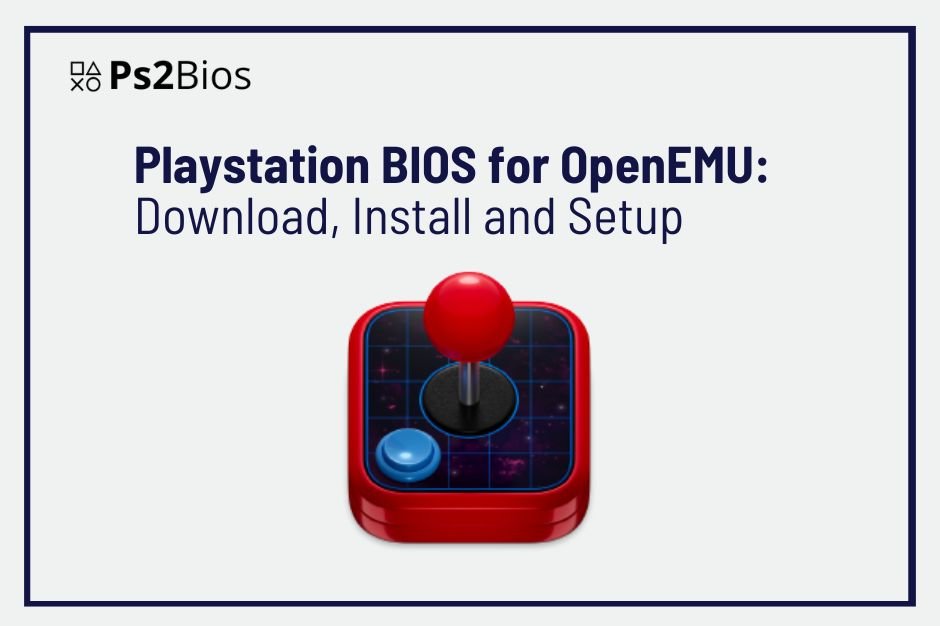PlayStation BIOS refers to the essential firmware that powers the PlayStation consoles, enabling their basic functionality and interactions with games. For gamers wishing to enjoy PlayStation titles on their computer, OpenEMU is one of the most popular emulator platforms, providing the capability to emulate multiple gaming consoles, including PlayStation systems. However, to run PlayStation games successfully on OpenEMU, a PS2 BIOS file is crucial. This BIOS file acts as the operating system for the emulator, replicating the PlayStation hardware and ensuring seamless gameplay.
In this article, we will guide you through everything you need to know about setting up and using the PlayStation BIOS for OpenEMU. We’ll start by exploring what OpenEMU is and how it functions as a cross-platform emulator for PlayStation games. Understanding the importance of the PS2 BIOS file will follow, shedding light on why it’s indispensable for OpenEMU’s performance. We’ll then dive into how to legally download the PlayStation BIOS and what versions are supported. Furthermore, we will walk you through the installation and setup process, common installation errors, and troubleshooting tips to get your PlayStation games up and running smoothly on OpenEMU.
What is OpenEMU?
OpenEMU is a powerful, open-source emulator designed to run various gaming consoles on modern systems. OpenEMU allows users to play classic PlayStation titles by emulating multiple consoles, including PlayStation 1, 2, and beyond, on macOS systems. This versatile emulator brings old-school gaming experiences to modern computers, creating a nostalgic platform for gamers. OpenEMU supports a wide range of game consoles beyond PlayStation, such as Nintendo and Sega systems, enhancing its utility as a universal gaming solution. As of 2021, OpenEMU has been lauded for its user-friendly interface and comprehensive multi-console support (Source: OpenEMU Wiki, 2021).
With OpenEMU in place, gamers can relive their favorite PlayStation games on their PCs, but to do so, they need an essential piece of the puzzle: the PlayStation BIOS. Next, let’s explore why a PS2 BIOS file is critical for OpenEMU.
Why is a PS2 BIOS file essential for OpenEMU?
The PlayStation 2 BIOS is a fundamental component for OpenEMU’s PS2 emulation to function correctly. The BIOS acts as the console’s operating system, facilitating game data processing and enabling hardware communication during gameplay. OpenEMU relies on the PS2 BIOS to ensure accurate emulation of PlayStation 2 games on modern devices. Without this BIOS, OpenEMU cannot initialize the PlayStation 2 environment, making it impossible to run PS2 games.
The PS2 BIOS includes crucial data, such as the initialization of video and audio outputs, system settings, and game compatibility checks, ensuring that OpenEMU delivers a smooth gaming experience. The PS2 BIOS file is required to replicate the PlayStation 2 system’s unique architecture within the emulator, making it an indispensable asset for PS2 gamers. For the next section, we’ll dive into where users can legally obtain PlayStation BIOS files for OpenEMU.
Where can you legally obtain PlayStation BIOS files for OpenEMU?
Legal concerns arise when downloading the PlayStation BIOS, as this file is copyrighted and cannot be distributed freely. Users must source it legally from either their personal PlayStation 2 console or from authorized websites offering instructions on obtaining the BIOS file through legal means. For example, gamers who already own a PS2 can extract the BIOS file directly from their own console using specific software tools that enable BIOS dumping. This ensures that they comply with copyright regulations while maintaining a legitimate file source.
A key legal guideline set forth by Sony is that BIOS files should only be used for emulation purposes if the user owns the original hardware, which is consistent with fair use laws. A legally obtained BIOS ensures that users can play their games in a manner that respects intellectual property rights. Now that we’ve covered the legality of obtaining the BIOS, let’s examine how OpenEMU handles the PlayStation BIOS.
How does OpenEMU handle PlayStation BIOS?
OpenEMU integrates the PlayStation BIOS seamlessly into its emulation system. Once the BIOS file is placed correctly within OpenEMU’s directory, the emulator uses it to initiate the PlayStation environment and simulate the console’s functions. The process includes loading the BIOS upon launch, where it initializes the PlayStation 2 system, activates video output, configures sound settings, and prepares the game for execution.
The PS2 BIOS file acts as the bridge between OpenEMU and the PlayStation 2 system, translating console commands and optimizing gameplay. For OpenEMU, the BIOS is crucial for maintaining compatibility with all PlayStation 2 titles. In addition, OpenEMU also supports custom configurations that allow users to tweak the BIOS settings to improve performance. Now, we will explore why the PlayStation BIOS is a critical component for OpenEMU’s functionality.
Why is the PlayStation BIOS important for OpenEMU?
The PlayStation BIOS serves as the core operating system for the emulation process, enabling OpenEMU to replicate the original hardware of the PlayStation console. This file is necessary for running PS1 and PS2 games because it emulates the console’s internal system and hardware communication protocols. Without the BIOS, the emulator cannot function properly, as it needs the BIOS to handle memory management, input devices, and other essential system tasks.
As a result, the PlayStation BIOS significantly influences the performance and compatibility of games on OpenEMU. Having the correct BIOS version is crucial for ensuring optimal game execution, as each BIOS version corresponds to a particular console version, such as the PS2 Slim or PS2 Fat, which can have slight system differences. Understanding these nuances is essential for gamers who want a flawless emulation experience. Let’s move on to how to download the PlayStation BIOS for OpenEMU.
How to Download PlayStation BIOS for OpenEMU?
Downloading the PlayStation BIOS for OpenEMU involves several steps, and it’s important to follow a secure and legal process to ensure compliance. First, users need to locate a legitimate BIOS file, which can be done by dumping the BIOS from a PS2 console or using trusted sources that offer guidance on legally acquiring the BIOS file. Next, ensure that the BIOS file matches the OpenEMU requirements, as the emulator supports specific versions for different console models.
Once obtained, users must carefully place the BIOS file in the appropriate folder within the OpenEMU directory. After doing so, OpenEMU will be ready to use the BIOS for PS2 game emulation. Now, let’s discuss the different PlayStation BIOS versions supported by OpenEMU.
What are the different PlayStation BIOS versions supported by OpenEMU?
OpenEMU supports several PlayStation BIOS versions that correspond to various PlayStation console models. These include the PS2 PAL and PS2 NTSC versions, designed for different regions of the world. The NTSC BIOS supports North American and Japanese versions of the PS2, while the PAL BIOS is used for European releases. Additionally, OpenEMU can also emulate custom BIOS versions for specific models, such as the PS2 Slim BIOS.
Each version of the BIOS is optimized to work with specific PlayStation systems, ensuring accurate emulation of games. It is important to select the right BIOS version for the region and console model to avoid compatibility issues. Let’s continue by exploring where users can legally download the PlayStation BIOS for OpenEMU.
Where can I legally download the PlayStation BIOS for OpenEMU?
The legal download of PlayStation BIOS files must be handled cautiously to avoid copyright infringement. As mentioned earlier, users can extract the BIOS file from their own PlayStation 2 consoles using tools designed for BIOS dumping. Sony and OpenEMU maintain strict guidelines for BIOS usage, and only legally obtained BIOS files should be used for emulation. Websites like EmuParadise used to offer BIOS files, but users should be cautious, as many such sites have been taken down due to legal issues.
For the most secure method, users should follow detailed tutorials to dump the BIOS from a PS2 console they own, ensuring that they comply with legal standards. Now, let’s explore how to install the PlayStation BIOS for OpenEMU.
How to Install PlayStation BIOS for OpenEMU?
Installing the PlayStation BIOS on OpenEMU is a straightforward process, but it requires attention to detail to ensure everything works correctly. First, download the BIOS file and place it in the BIOS folder inside OpenEMU’s system directory. After that, configure OpenEMU’s settings to point to the BIOS file location.
Next, launch OpenEMU and verify that the system detects the BIOS. If all steps are completed properly, OpenEMU will use the BIOS to emulate PlayStation games. Now, let’s take a look at some common errors that users might encounter when installing the BIOS.
What are Common Errors When Installing PlayStation BIOS in OpenEMU?
Common errors during the installation of PlayStation BIOS in OpenEMU include incorrect file placement or using an incompatible BIOS version. Users may encounter issues like OpenEMU not detecting the BIOS or games failing to launch. These issues are usually caused by mismatched BIOS versions or missing files in the system directory. Another common issue is file corruption, which can happen if the BIOS is not downloaded correctly.
To resolve these errors, users should ensure that the BIOS is properly installed in the correct folder and that it matches the emulator’s required specifications. Now, let’s proceed to learn how to set up the PlayStation BIOS for OpenEMU.
How to Setup the PlayStation BIOS for OpenEMU?
Setting up the PlayStation BIOS in OpenEMU involves ensuring that all settings are configured for optimal emulation. After installing the BIOS, users should configure the video and audio settings within OpenEMU to match their system’s capabilities. OpenEMU provides options to adjust graphics, frame rates, and sound quality, making the gaming experience smoother. Users can also update their controller settings to ensure a comfortable gaming experience.
Once the setup is complete, users should test the system by running a few PlayStation games to ensure everything functions properly. Now, let’s move on to discussing what PlayStation games you can enjoy on OpenEMU.
What PlayStation Games I can play on OpenEMU?
OpenEMU supports a variety of PlayStation games, spanning PS1, PS2, and even PS3 titles. The compatibility depends on the BIOS version and the system configuration. Popular games such as Final Fantasy VII and Gran Turismo for PS1, and Grand Theft Auto: San Andreas for PS2, are known to run smoothly on OpenEMU.
Can OpenEMU Run PlayStation 1, 2, and 3 Games?
Yes, OpenEMU supports emulation for PS1 and PS2 games, but PS3 games may require a more robust system configuration or specialized emulators, as OpenEMU primarily focuses on older PlayStation systems. The emulator ensures that these games run with high accuracy by utilizing the correct PlayStation BIOS.
How to troubleshoot BIOS errors in OpenEMU?
Troubleshooting BIOS errors in OpenEMU often involves checking the BIOS file integrity, verifying the correct file version, and ensuring the proper installation path. Errors can also be due to incorrect system settings or incompatibility with game files. Ensuring that the system requirements meet the demands of the emulator is crucial.
How to update the PlayStation BIOS in OpenEMU?
Updating the PlayStation BIOS involves replacing the existing BIOS file with a newer version if one is available. Ensure that the new BIOS version is compatible with OpenEMU and is placed in the correct folder to avoid issues during emulation.
In conclusion, downloading, installing, and setting up the PlayStation BIOS for OpenEMU ensures a smooth and enjoyable emulation experience, enabling gamers to play their favorite PlayStation games seamlessly.


